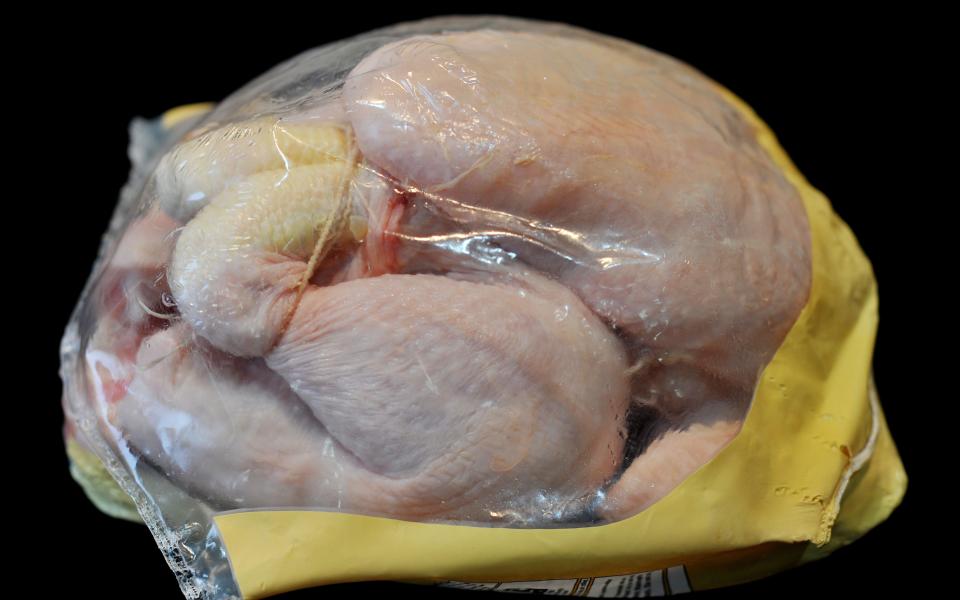Supermarket shoppers urged to wash hands before eating - as 9 million 'bug-covered' chicken packs are sold each year
Supermarket shoppers should wash their hands before snacking and feeding children, two of the UK's leading food safety experts have warned, after it has emerged that 9 million packs of chickens are sold each year with a dangerous dose of deadly bacteria on the outside.
A Daily Telegraph investigation has established that the plastic exterior of more than 1 in every 100 raw chickens sold by Britain's biggest retailers is harbouring a potentially infectious level of camplyobacter.
Campylobacter is the UK's leading cause of food poisoning with 485,000 recorded cases last year, according to Public Health England.
The Food Standards Agency estimates that the bug causes around 100 deaths a year. Previously the FSA has described the risk of people becoming ill as a result of bacteria on the outside of packaging as "extremely unlikely".
Instead it has focussed on educating the public about the safe handling and cooking of raw chicken meat. But now food safety experts are now warning that hungry shoppers who eat snacks with their bare hands after picking up plastic packs of raw supermarket chicken are unwittingly putting themselves at risk.
Dr Lisa Ackerley, an independent food hygiene expert, said: "I strongly suspect that many food poisoning cases are from cross contamination, which may involve the spread of bacteria from contaminated hands to mouth as well as via contaminated food.
The routes of transmission could be much wider than people release. "For example people quite often get hungry in the supermarket and may buy snacks such as crisps to eat on the way home. But if they've picked up chicken with bacteria on the outside packaging and licked their fingers they could consume enough bacteria to become ill."
Prof Tim Lang at the Centre for Food Policy, said it was "shocking" that 9 million packs of chicken with potentially dangerous levels of bacteria on the outside were being sold per year without more being done to protect the public.
He said: "This is an extremely unwise position for the FSA to be taking. Reducing cross contamination should be their number one concern. No consumer expects to become ill as a result of touching plastic packaging while shopping. At the least shoppers should be washing their hands after picking up chicken, but how far do you go? Should they be provided with rubber gloves as well?"
A source close to the situation claimed that supermarkets have been particularly reluctant to address the problem of campylobacter lurking on the outside of packaging as they are concerned it could scare consumers and have a negative impact on chicken sales.
Last year a number of major supermarkets ignored the FSA's calls for them to reduce the risk of cross contamination by offering small plastic bags to separate raw chicken from other food.
The FSA's former chief executive Catherine Brown previously admitted supermarkets had "pushed back" against providing information on campylobacter, claimed they were unhappy over its league tables, which named and shamed individual retailers.
In its latest campylobacter update the FSA refrained from naming and shaming retailers, claiming doing so had ceased to represent a "fair comparison".
In 2015 the FSA issued a statement which said: "In our year-long survey of campylobacter levels in UK shop-bought chicken, we found only five of more than 4011 samples (0.1pc) had the highest levels of campylobacter on the outside packaging. It is extremely unlikely that someone could become ill from the packaging."
But this newspaper's analysis of the FSA's own data suggests the risk was ten times higher than indicated by this statement. In 2015 1.3pc of packs had had a medium level of bacteria on the outside, which scientists agree is a high enough dose to make someone ill. Data for 2016 showed 1.1pc of packs had this level on the outer packaging.
Of the around 650 million chickens sold in supermarkets every year it means around 9 million have a potentially infectious level of bacteria on the outer pack.
An FSA spokesman said: "We have never said that the only risk is from packs with >1000cfu/swab [the highest level of bacteria]. We have said that these present the greatest risk from the packaging, although we maintain that the overall risk is extremely low."
Andrew Opie, director of food and sustainability at the British Retail Consortium, which represents supermarkets, said: “Tackling campylobacter is the number one food safety priority for UK retailers and they are making real progress with partners like poultry processors and farmers in tackling this issue. Customers know the importance of safe handling and cooking of raw meat at home and supermarkets provide clear and simple on-pack advice to help with this.”
The FSA confirmed it will return to naming and shaming retailers in its forthcoming campylobacter update which is due to be published next month.

 Yahoo News
Yahoo News 

